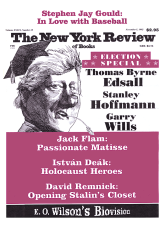In response to:
Splendor and Miseries from the July 16, 1992 issue
To the Editors:
As Francine du Plessix Gray points out [“Splendor and Miseries,” NYR, July 16], sex work is now fashionable terminology for prostitution. A “sex worker” myself for over a decade, I am skeptical about a trend which puts more picturesque language out of business.
In the ’80s, sex work was coined by activists in the prostitutes’ movement to describe a range of commercial sex. Porn stars, erotic dancers, peep show performers, sex writers, and others in the trade made it obvious that the prostitutes’ movement should broaden its language. Thus, the inclusive sex worker. But sex work is also code. In two words, “selling sex is just another occupation.” Sex work sidesteps any pejorative meanings associated with to prostitute (the verb) and prostitute (the person).
As an activist hooker, I have helped to promote the fashionable status of the term sex work (and, apparently, of actual sex workers). Sometimes I have my regrets. Sex work doesn’t sound immoral, but it doesn’t sound like fun, either. Sex worker is to prostitute what gender is to sex: a usage (with some practical value) which is also identified with political rectitude.
Sex worker is “gender-free.” It’s true that males, females, and transsexuals can sell sex. But “genderless” lingo enables feminists to ignore the fact that differences between men and women are accepted in our industry—rather than neurotically denied, as is often the case in other fields.
Many indoor hookers complain that the word prostitute conjures up the image of a too-explicit street hussy. But I am alarmed to note that sex worker conjures up no image at all! Prostitutes, go-go dancers, porn stars are their images. The erotic image is our bread and butter—and the thing which makes us different from people in more prosaic occupations. Many of our feminist supporters have been using language to diminish the whore’s sensationalistic image—hoping to claim her as one of their mundane “sisters.” This is the price, it seems, of feminist support.
Sex work connotes that prostitutes are engaged in labor rather than business, making us acceptable to those who abhor the very thing we represent: a free market. In the old days, when the left was consistent, the only good whore was a “down- trodden” or reformed whore. In the ’70s, when Vietnamese prostitutes were sent to camps for their political “re-education,” many a socialist-feminist in the West took heart. In the ’90s, unrepentant harlots have been featured on WBAI, courted by ACTUP, praised in the pages of the Village Voice and The Nation. Politics makes for bedfellows even a prostitute would consider strange, and our new terminology has served as a political mating call to the left.
Sex work—a term once employed for practical reasons—has taken on a political life of its own, and we who purvey erotic pleasure are increasingly desexualized by politically correct language. But this is not surprising, given the tendency of the prostitutes’ movement to entertain the ideological fads of our various supporters.
Tracy Quan
PONY (Prostitutes of New York)
New York City
Francine du Plessix Gray replies:
In deference to the expertise of any professional group, all a writer can do is to respect the terminology that members of that profession prefer to observe. So I used the term “sex worker” because that is currently the expression favored by many members of Ms. Quan’s profession (and initially approved, one should note, by Ms. Quan herself).
But I am most grateful to Ms. Quan for her beautifully stated response, and I take to heart her subtle and witty insights into the mercurial nature of current political language.
This Issue
November 5, 1992



